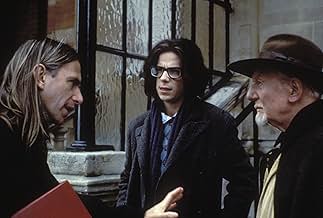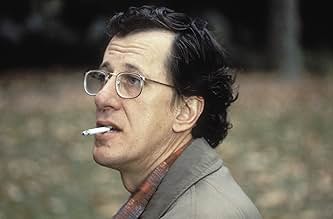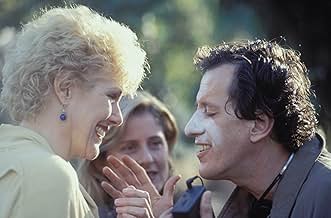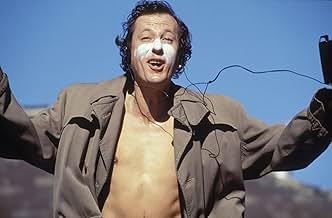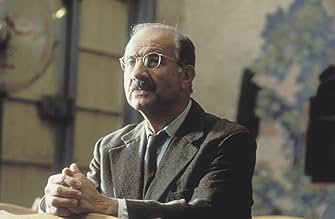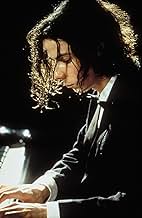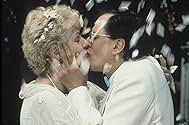CALIFICACIÓN DE IMDb
7.6/10
58 k
TU CALIFICACIÓN
El pianista David Helfgott, impulsado por su padre y maestros, sufre una crisis. Años después, vuelve a tocar el piano entre los vítores de la gente y de la crítica.El pianista David Helfgott, impulsado por su padre y maestros, sufre una crisis. Años después, vuelve a tocar el piano entre los vítores de la gente y de la crítica.El pianista David Helfgott, impulsado por su padre y maestros, sufre una crisis. Años después, vuelve a tocar el piano entre los vítores de la gente y de la crítica.
- Ganó 1 premio Óscar
- 46 premios ganados y 52 nominaciones en total
- Dirección
- Guionistas
- Todo el elenco y el equipo
- Producción, taquilla y más en IMDbPro
Argumento
¿Sabías que…?
- TriviaGeoffrey Rush had once learned the piano up until aged fourteen. He took up piano lessons again thirty years later for this movie and also acted as his own hand double and body double.
- ErroresThe character shows all signs of schizophrenia; not bipolar disorder (formerly known as "manic-depressive disorder"), as is claimed in the film. The real David Helfgott likewise displays many symptoms of schizophrenia and none of bipolar disorder.
- Citas
Cecil Parkes: You must play as if there's no tomorrow.
- Créditos curiososHimself: hand double for Geoffrey Rush
- Bandas sonorasWith A Girl Like You
Written by Reg Presley
© 1966 Dick James Music Limited
Performed by The Troggs
© 1966 Mercury Ltd. London
Opinión destacada
"Shine" purports to tell the story of David Helfgott (Geoffrey Rush, who plays the adult Helfgott), a promising pianist who overcame mental illness, with the help of his wife, and returned to performing.
The 1996 film is actually a fictionalized version of Helfgott's life - but even had it not been based on a true story, it remains a powerful, intriguing film.
David is the child of German émigrés who now live in Australia. His father Peter (Armin Mueller-Stahl) is a self-taught pianist who teaches David his same love of piano and classical music. There is love there, but as portrayed in the movie, Peter is a rigid man who gives his son mixed signals. He drives his son to succeed as a pianist, teaching him that winning is everything, and yet, when David has opportunities that would take him away from the family, Peter won't permit it. The reason for this is that Peter and his wife lost relatives in the Holocaust. Peter is also given to physical abuse toward David when he loses his temper.
David finally gets away from him and attends the Royal Conservatory in London, where, with the help of his teacher (John Gielgud), he wins an important competition but then suffers a severe nervous breakdown. The rest of the movie deals with the road back, which leads him home to Australia and to his wife, Gillian. Gillian is actually his second wife, though the first marriage isn't mentioned in the film.
The dominant performances belong to Rush and Mueller-Stahl. Rush does a brilliant job of showing us the likable but stuttering David who speaks rapidly and repetitively, expressing himself through music. Mueller-Stahl as the tortured Peter is fabulous, a man who is both monstrous and pitiable. In a small role, John Gielgud of course makes a fine impression as an elderly teacher, a wonderful pianist himself, who believes in David's talent.
The best scene is David playing Rachmaninoff's Piano Concerto #3 - Helfgott's own recording of the piece is used - and the aftermath. What I missed in this film is music - there was a lot of talk about David's promise, but until the Rachmaninoff not much playing.
Helfgott's work today has been deeply criticized for being - well, lousy. A review in The New York Times of one of his concerts is horrible. The reviewer, however, mentions that Helfgott occasionally showed vestiges of excellent technique. I think it's safe to assume that his playing nowadays is more erratic than it was in his earlier years. There are several examples of Helfgott's playing in the movie: "La Campanella," "Hungarian Rhapsody No 2 In C Sharp Minor," "Flight of the Bumble Bee," Rachmaninoff's "Prelude In C Sharp Minor, Opus 3, No. 2," the previously mentioned Rachmaninoff 3, and Liszt's "Sospiro," and it is all quite stunning. Rush does the fingerings himself. One of the comments also claims that Helfgott's wife has Helfgott perform on no medication so that he'll seem crazy - it's common for performers on medication for mental problems to have to cycle off of it before performing. I don't think the commenter has any idea what Helfgot is like on his medication - certainly in the film, he acts strangely.
"Shine" is highly recommended for its fantastic performances, beautiful music, and its inspiring story.
The 1996 film is actually a fictionalized version of Helfgott's life - but even had it not been based on a true story, it remains a powerful, intriguing film.
David is the child of German émigrés who now live in Australia. His father Peter (Armin Mueller-Stahl) is a self-taught pianist who teaches David his same love of piano and classical music. There is love there, but as portrayed in the movie, Peter is a rigid man who gives his son mixed signals. He drives his son to succeed as a pianist, teaching him that winning is everything, and yet, when David has opportunities that would take him away from the family, Peter won't permit it. The reason for this is that Peter and his wife lost relatives in the Holocaust. Peter is also given to physical abuse toward David when he loses his temper.
David finally gets away from him and attends the Royal Conservatory in London, where, with the help of his teacher (John Gielgud), he wins an important competition but then suffers a severe nervous breakdown. The rest of the movie deals with the road back, which leads him home to Australia and to his wife, Gillian. Gillian is actually his second wife, though the first marriage isn't mentioned in the film.
The dominant performances belong to Rush and Mueller-Stahl. Rush does a brilliant job of showing us the likable but stuttering David who speaks rapidly and repetitively, expressing himself through music. Mueller-Stahl as the tortured Peter is fabulous, a man who is both monstrous and pitiable. In a small role, John Gielgud of course makes a fine impression as an elderly teacher, a wonderful pianist himself, who believes in David's talent.
The best scene is David playing Rachmaninoff's Piano Concerto #3 - Helfgott's own recording of the piece is used - and the aftermath. What I missed in this film is music - there was a lot of talk about David's promise, but until the Rachmaninoff not much playing.
Helfgott's work today has been deeply criticized for being - well, lousy. A review in The New York Times of one of his concerts is horrible. The reviewer, however, mentions that Helfgott occasionally showed vestiges of excellent technique. I think it's safe to assume that his playing nowadays is more erratic than it was in his earlier years. There are several examples of Helfgott's playing in the movie: "La Campanella," "Hungarian Rhapsody No 2 In C Sharp Minor," "Flight of the Bumble Bee," Rachmaninoff's "Prelude In C Sharp Minor, Opus 3, No. 2," the previously mentioned Rachmaninoff 3, and Liszt's "Sospiro," and it is all quite stunning. Rush does the fingerings himself. One of the comments also claims that Helfgott's wife has Helfgott perform on no medication so that he'll seem crazy - it's common for performers on medication for mental problems to have to cycle off of it before performing. I don't think the commenter has any idea what Helfgot is like on his medication - certainly in the film, he acts strangely.
"Shine" is highly recommended for its fantastic performances, beautiful music, and its inspiring story.
- blanche-2
- 2 abr 2009
- Enlace permanente
Selecciones populares
Inicia sesión para calificar y agrega a la lista de videos para obtener recomendaciones personalizadas
- How long is Shine?Con tecnología de Alexa
Detalles
- Fecha de lanzamiento
- País de origen
- Sitios oficiales
- Idiomas
- También se conoce como
- Shine
- Locaciones de filmación
- Productoras
- Ver más créditos de la compañía en IMDbPro
Taquilla
- Presupuesto
- USD 5,500,000 (estimado)
- Total en EE. UU. y Canadá
- USD 35,892,330
- Fin de semana de estreno en EE. UU. y Canadá
- USD 162,179
- 24 nov 1996
- Total a nivel mundial
- USD 35,999,121
- Tiempo de ejecución1 hora 45 minutos
- Color
- Mezcla de sonido
- Relación de aspecto
- 1.85 : 1
Contribuir a esta página
Sugiere una edición o agrega el contenido que falta

Principales brechas de datos
By what name was Claroscuro (1996) officially released in India in Hindi?
Responda



